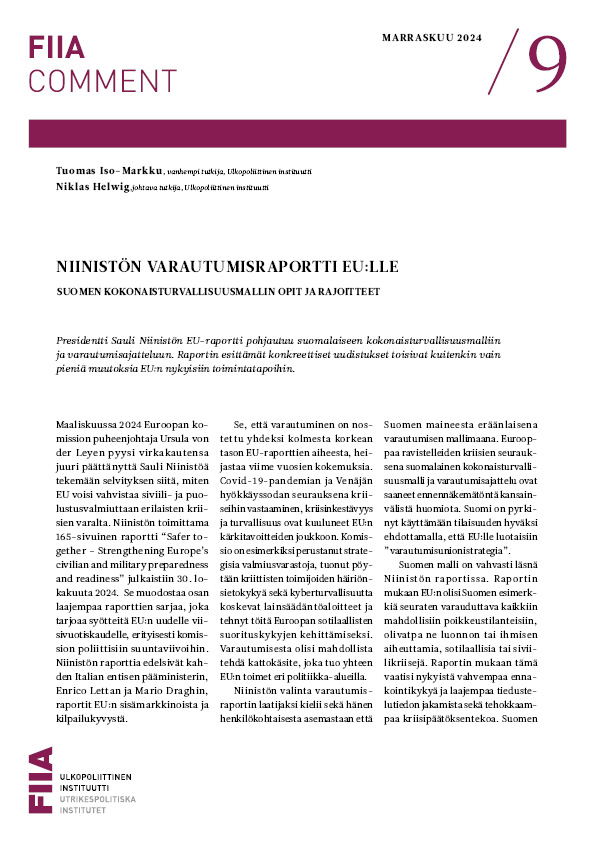Prime Minister Bidzina Ivanishvili is stealing the show before the upcoming presidential elections with his announcement to quit politics. His private plans will increase the instability of the country and may have dramatic consequences for both the domestic and foreign policies of Georgia.
The presidential elections on 27 October will most likely be free and fair, but they hold little significance for Georgia’s future. Due to the constitutional reform, the president will have a secondary role in the country after the prime minister.
This is reflected in the candidates. The most popular among them is Giorgi Margvelashvili (the Georgian Dream, GD), who is unknown to the general public, lacking ambition and characterized as too inexperienced to lead the country. However, he was nominated by the very popular Prime Minister Ivanishvili, which should be enough to get him elected.
In order to raise the stakes in the elections, overshadowed by Ivanishvili’s announcement to resign from the premiership soon afterwards, Margvelashvili has promised to withdraw from the race if he is not chosen in the first round.
Ivanishvili was the big winner in last year’s parliamentary elections when he managed to assemble a very fragmented and quarrelsome opposition into a coalition called the Georgian Dream. Even if progress in issues that matter to Georgians – namely employment, territorial integrity and the economy – has been minimal to date, high hopes are still riding on him due to his reputation as a generous benefactor of the Georgian people.
However, leaving Georgia after ruling for only one year, and immediately after the long-standing President Mikheil Saakashvili steps down, will leave Georgia without any charismatic leader for the first time in its history. Ivanishvili intends to name his successor after the elections. Since the GD holds the majority in Parliament, Ivanishvili’s appointed trustee will get the necessary legal approval in Parliament without new parliamentary elections.
But whoever the new prime minister is, he surely cannot compete with the charisma and popularity of Ivanishvili himself. This seems to be Ivanishvili’s goal, since the only hint about his plans is that he wants to help strengthen civil society instead of being the next “saviour” of Georgia. Is the Georgian political system and culture ready for such a leaderless nexus?
When it came to domestic politics President Saakashvili brought about a number of important reforms and fought fiercely against corruption and organized crime, irrespective of the enemies he made along the way. Among them are people from the political opposition, which Saakashvili cracked down on by dominating the media and interfering with the justice system, as well as many former allies, including Ivanishvili himself, who failed to bend to Saakashvili’s will.
Worthy enemies are also the former “thieves in law” that ruled many facets of economic and political life in Georgia before Saakashvili embarked on his crusade against corruption and organized crime.
During the electoral campaign for the 2012 parliamentary elections, Ivanishvili managed to gather all Saakashvili’s enemies into one coalition and push Saakashvili’s party into opposition. Now that Ivanishvili is resigning and the common adversary Saakashvili is out of the picture, the big question is not if, but when the coalition will break down.
There have already been worrisome signs of growing ultranationalism, religious fundamentalism, as well as anti-gay, -Armenian, and -Muslim attitudes. A significant problem may also be posed by a rise in criminal activity, since Ivanishvili has pardoned and released thousands of prisoners that he considered political.
Saakashvili’s strong pro-Western policies made it possible for Georgia to stand on the doorstep of Europe instead of being relegated to the Russian backyard. Last July, Georgia concluded talks over a Deep and
Comprehensive Free Trade Agreement (DCFTA) with the EU and there are hopes of initiating an Association Agreement at the Vilnius summit at the end of November. Both agreements will be ready for signing next spring.
However, it is unclear whether Georgia is ready to really commit to European values now that the president and the prime minister are both changing at a very crucial moment. Georgian public opinion seems to be in favour of a European approach, at least in theory, but few know what it means in practice. Despite the DCFTA, many Georgian products are still not meeting EU requirements and the markets remain distant.
In this respect, the recent opening of Russian markets to Georgian products may actually have a bigger impact on the Georgian economy. At the same time, with the concessions regarding access to the markets, Russia has tightened up its security policy in the Georgian territories by erecting new fences in South Ossetia, which has been occupied by Russia since the 2008 war.
These measures have been justified by the Sochi Winter Olympics in 2014, but it would be naïve to think that Russia would loosen its grip on such good geostrategic positions even after the Games. This twofold policy is likely to destabilize Georgian politics by creating more fragmentation in an already vulnerable situation. If the EU is not able to justify its role in Georgia by making itself more desirable and beneficial for ordinary citizens, it is possible that the Georgian resolve to continue on the road towards Europe will dwindle.
Whatever lies in store for Georgia, Prime Minister Ivanishvili is now playing the key role. Thus far, Ivanishvili has demonstrated strong leadership, a willingness to handle the specifics, and a low tolerance for political rivals, which may indicate that he will still play a significant role behind the scenes.
Secrecy over his plans, and maneouvring with regard to his successor and the presidential candidate are not signs of a healthy democracy, but they may be forgivable if the goal really is a strong civil society that is no longer dependent on charismatic leaders.









